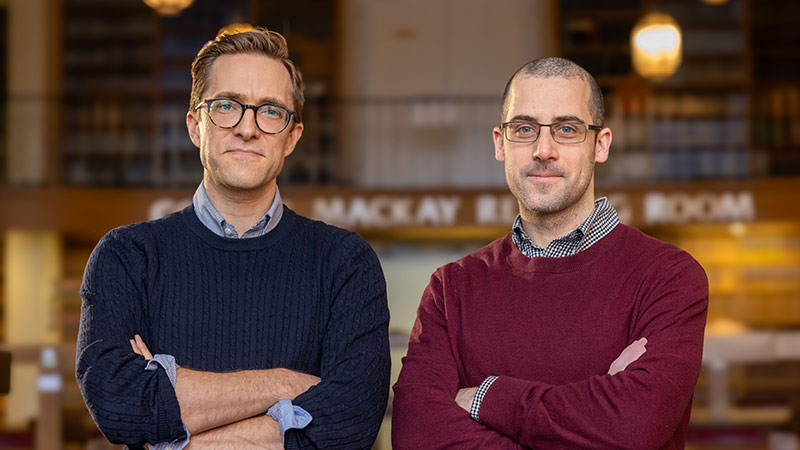Legal Innovation Lab leading digital transformation of N.B.’s justice system
Author: Hilary Creamer Robinson
Posted on Jan 17, 2024
Category: UNB Saint John , UNB Fredericton , Research

Photo: Jacob Powning and Kyle Cullen. Photographer: Ashley Phinney.
New Brunswick’s justice system will soon experience a digital overhaul that will improve access to justice for all its residents.
In its current state, the system is heavily reliant on paper and in-person proceedings, creating slow and often inaccessible processes for both users and practitioners.
Argyri Panezi, Canada Research Chair in Digital Information Law, is leading the charge in close collaboration with New Brunswick’s Chief Justices, Tracey DeWare and Marc Richard.
Panezi, who is founding director of the University of New Brunswick’s new Legal Innovation Lab — the first and only of its kind in Canada — is working alongside a team of UNB Law student researchers to digitally transform the province’s justice system.
“We are looking at how this old institution — the justice system — is adapting and will adapt in the future to rapid technological changes and the evolving needs of citizens in terms of access to information,” said Panezi.
The team is focusing on the importance of access to knowledge in the digital age in the justice sector, which Panezi says is a chronically under-explored topic.
“The digitization and accessibility of legal information unquestionably helps citizens’ access to justice,” she said.
The e-justice and artificial intelligence and the law expert, who earned her master of laws from Harvard University and PhD in law from the European University Institute, is a contributing member of the Digital Civil Society Lab at Stanford University, the Jean Monnet Centre of Excellence for Law and Automation at IE Law School, and the Canadian Institute for Cybersecurity at UNB.

This year, Panezi is leading several major projects through the Legal Innovation Lab aimed at improving New Brunswick’s legal system, including launching an uncontested divorce e-filing pilot, re-designing the New Brunswick Courts’ website, organizing the province’s second annual Access to Justice Summit, and examining the risks and benefits of the use of artificial intelligence within the justice system.
But first, Panezi and her team, along with the Canadian Institute for Access to Justice, will release a report in both official languages outlining the province’s current approach to the adoption of digitalization and artificial intelligence within its justice system.
The report’s findings are largely informed by interviews with the province’s chief justices and key stakeholders within the legal system, who, Panezi says, are enthusiastic supporters of the thoughtful implementation of e-justice systems in New Brunswick.
“Chief Justices DeWare and Richard both encourage the regional transformation of the courts and the province,” said Panezi. “They have been extremely positive and supportive of our work at the Legal Innovation Lab.”
As Canada’s only bilingual province, Panezi and her research team are focusing on language requirements as they relate to technological advancements in the judicial sector and providing equitable e-justice practices for both English and French speakers. Other prioritized groups include multilingual and rurally located New Brunswickers.
The lab’s update of the New Brunswick Courts’ website will play a pivotal role in giving all New Brunswickers equitable access to information.
“We're trying to find ways to integrate up-to-date technologies and make the Courts’ website more user-friendly,” said Legal Innovation Lab research assistant and second year UNB Law student, Kyle Cullen, who is one of several student researchers designing the revamp.
Cullen says the updated site will provide users with more intuitive and direct access to the specific information they're seeking.
“This is a very new, unique and underdeveloped area of the law,” he said. “It might sound like a simple update for a website, but it will go a long way as far as access to justice is concerned.”
Of course, advances in technology often create as many legal questions and problems as they solve. In light of this, the team is working to find solutions to privacy and security issues within e-justice.
Second-year law student and Legal Innovation Lab research assistant, Jacob Powning is spearheading the examination.
“This is a really new and strange world we’re living in,” said Powning. “I'm very interested in how we deal with artificial intelligence (AI) and what it means for the law.”
Specifically, Powning is examining AI and translation. “Not everybody understands what happens to the data and information they enter into a translator. There are important privacy concerns to consider.”
The Legal Innovation Lab, Powning said, is at the forefront of this area of research, citing how its launch directly coincided with the birth of Chat GPT.
“I think there's a real chance that the Legal Innovation Lab will be something that we look back on in 10 years and see as a national institution that has real value,” he said.
Panezi says the involvement of law students like Powning and Cullen is integral to the lab’s success.
“These are fantastic students who are invested in making a difference in the province, who want to make an impact,” said Panezi. “They take the change they can make very seriously.”
Change Panezi is hopeful that she and her rotating team of law student researchers will successfully implement in the lifetime of her Canada Research Chair in Digital Information Law appointment.
“In five years, I would like to see secure and unified case management and filing systems in New Brunswick’s courts,” Panezi said. “That would be a big win for the system and for all New Brunswickers.”
The University of New Brunswick (UNB) is home to transformative teaching in more than 100 innovative and interdisciplinary programs. Over the next four weeks, we will share stories that showcase how some of these programs help students define their purpose and shape their future by gaining the skills the world needs now.
Other stories in this series:
How virtual reality can help address the nursing shortage in N.B.
